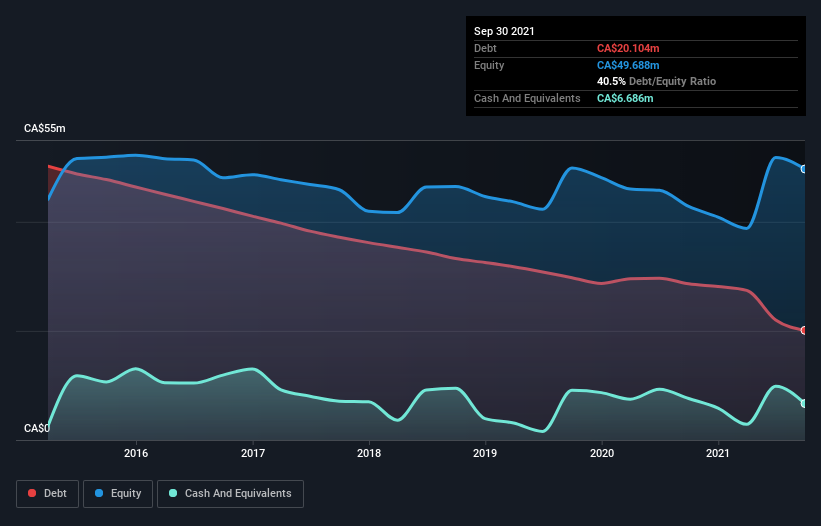Howard Marks put it nicely when he said that, rather than worrying about share price volatility, 'The possibility of permanent loss is the risk I worry about... and every practical investor I know worries about.' So it might be obvious that you need to consider debt, when you think about how risky any given stock is, because too much debt can sink a company. As with many other companies TeraGo Inc. (TSE:TGO) makes use of debt. But should shareholders be worried about its use of debt?
What Risk Does Debt Bring?
Debt is a tool to help businesses grow, but if a business is incapable of paying off its lenders, then it exists at their mercy. If things get really bad, the lenders can take control of the business. However, a more frequent (but still costly) occurrence is where a company must issue shares at bargain-basement prices, permanently diluting shareholders, just to shore up its balance sheet. By replacing dilution, though, debt can be an extremely good tool for businesses that need capital to invest in growth at high rates of return. When we examine debt levels, we first consider both cash and debt levels, together.
See our latest analysis for TeraGo
What Is TeraGo's Net Debt?
The image below, which you can click on for greater detail, shows that TeraGo had debt of CA$20.1m at the end of September 2021, a reduction from CA$28.6m over a year. On the flip side, it has CA$6.69m in cash leading to net debt of about CA$13.4m.

How Strong Is TeraGo's Balance Sheet?
The latest balance sheet data shows that TeraGo had liabilities of CA$14.7m due within a year, and liabilities of CA$37.6m falling due after that. Offsetting this, it had CA$6.69m in cash and CA$3.08m in receivables that were due within 12 months. So it has liabilities totalling CA$42.5m more than its cash and near-term receivables, combined.
TeraGo has a market capitalization of CA$122.8m, so it could very likely raise cash to ameliorate its balance sheet, if the need arose. But we definitely want to keep our eyes open to indications that its debt is bringing too much risk. When analysing debt levels, the balance sheet is the obvious place to start. But ultimately the future profitability of the business will decide if TeraGo can strengthen its balance sheet over time. So if you're focused on the future you can check out this free report showing analyst profit forecasts.
Over 12 months, TeraGo made a loss at the EBIT level, and saw its revenue drop to CA$44m, which is a fall of 6.5%. We would much prefer see growth.
Caveat Emptor
Over the last twelve months TeraGo produced an earnings before interest and tax (EBIT) loss. Indeed, it lost CA$3.2m at the EBIT level. When we look at that and recall the liabilities on its balance sheet, relative to cash, it seems unwise to us for the company to have any debt. So we think its balance sheet is a little strained, though not beyond repair. For example, we would not want to see a repeat of last year's loss of CA$8.4m. So to be blunt we do think it is risky. When analysing debt levels, the balance sheet is the obvious place to start. But ultimately, every company can contain risks that exist outside of the balance sheet. For instance, we've identified 3 warning signs for TeraGo that you should be aware of.
If, after all that, you're more interested in a fast growing company with a rock-solid balance sheet, then check out our list of net cash growth stocks without delay.
Valuation is complex, but we're here to simplify it.
Discover if TeraGo might be undervalued or overvalued with our detailed analysis, featuring fair value estimates, potential risks, dividends, insider trades, and its financial condition.
Access Free AnalysisHave feedback on this article? Concerned about the content? Get in touch with us directly. Alternatively, email editorial-team (at) simplywallst.com.
This article by Simply Wall St is general in nature. We provide commentary based on historical data and analyst forecasts only using an unbiased methodology and our articles are not intended to be financial advice. It does not constitute a recommendation to buy or sell any stock, and does not take account of your objectives, or your financial situation. We aim to bring you long-term focused analysis driven by fundamental data. Note that our analysis may not factor in the latest price-sensitive company announcements or qualitative material. Simply Wall St has no position in any stocks mentioned.
About TSX:TGO
Good value with low risk.
Similar Companies
Market Insights
Community Narratives



